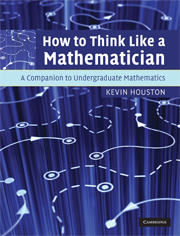Book contents
- Frontmatter
- Contents
- Preface
- I Study skills for mathematicians
- II How to think logically
- III Definitions, theorems and proofs
- 14 Definitions, theorems and proofs
- 15 How to read a definition
- 16 How to read a theorem
- 17 Proof
- 18 How to read a proof
- 19 A study of Pythagoras' Theorem
- IV Techniques of proof
- V Mathematics that all good mathematicians need
- VI Closing remarks
- Appendices
- Index
14 - Definitions, theorems and proofs
from III - Definitions, theorems and proofs
- Frontmatter
- Contents
- Preface
- I Study skills for mathematicians
- II How to think logically
- III Definitions, theorems and proofs
- 14 Definitions, theorems and proofs
- 15 How to read a definition
- 16 How to read a theorem
- 17 Proof
- 18 How to read a proof
- 19 A study of Pythagoras' Theorem
- IV Techniques of proof
- V Mathematics that all good mathematicians need
- VI Closing remarks
- Appendices
- Index
Summary
The highest form of pure thought is in mathematics.
PlatoWe now come to the heart of how mathematicians organize and present their work. Look through any high-level mathematics book (or see Chapter 1) and you will find that mathematics is not presented as one continuous piece of prose like a novel. Instead the text is divided up into small nuggets of information such as a Theorem, Proposition, Lemma, Corollary, Proof, Definition and Conjecture. All of these have special meanings and we will see how to approach them in the following chapters.
Meanings
We shall now briefly describe the meanings of the above words.
Definition: an explanation of the mathematical meaning of a word.
Theorem: a very important true statement.
Proposition: a less important but nonetheless interesting true statement.
Lemma: a true statement used in proving other true statements.
Corollary: a true statement that is a simple deduction from a theorem or proposition.
Proof: the explanation of why a statement is true.
Conjecture: a statement believed to be true, but for which we have no proof.
Axiom: a basic assumption about a mathematical situation.
Definitions
Much more will be said about definitions in the next chapter. For the moment let us say that in higher mathematics close attention must be paid to definitions – much more than at lower levels. Definitions allow us to separate one class of objects from another or single out some interesting property.
- Type
- Chapter
- Information
- How to Think Like a MathematicianA Companion to Undergraduate Mathematics, pp. 99 - 102Publisher: Cambridge University PressPrint publication year: 2009



